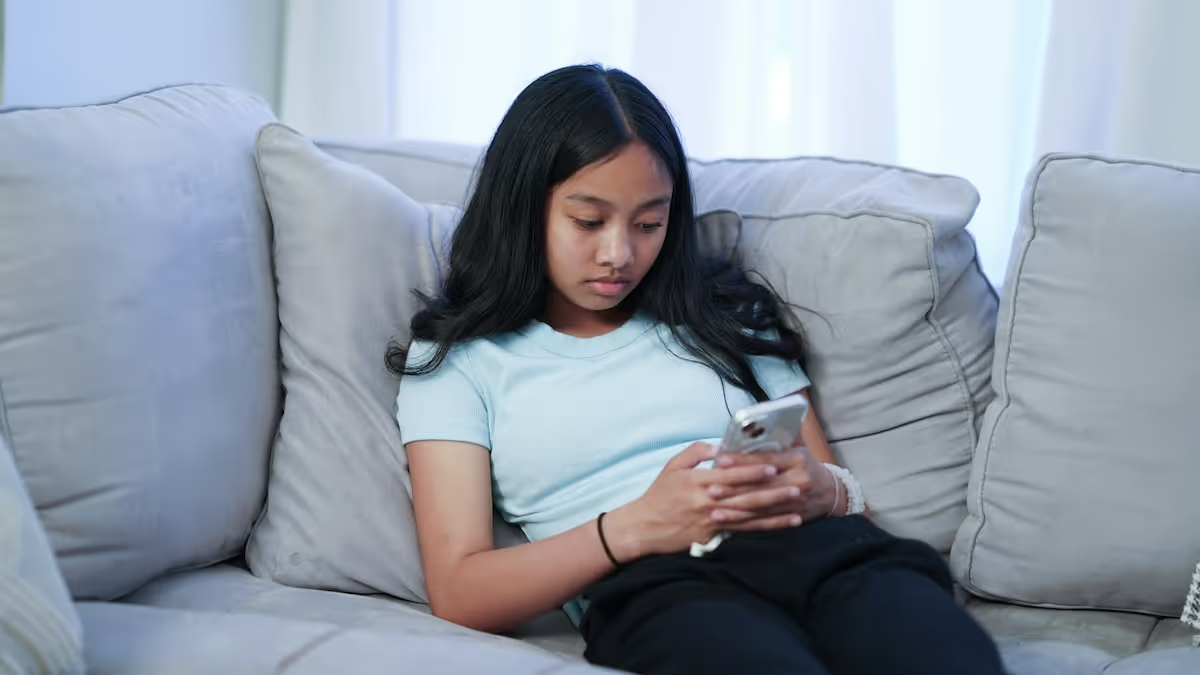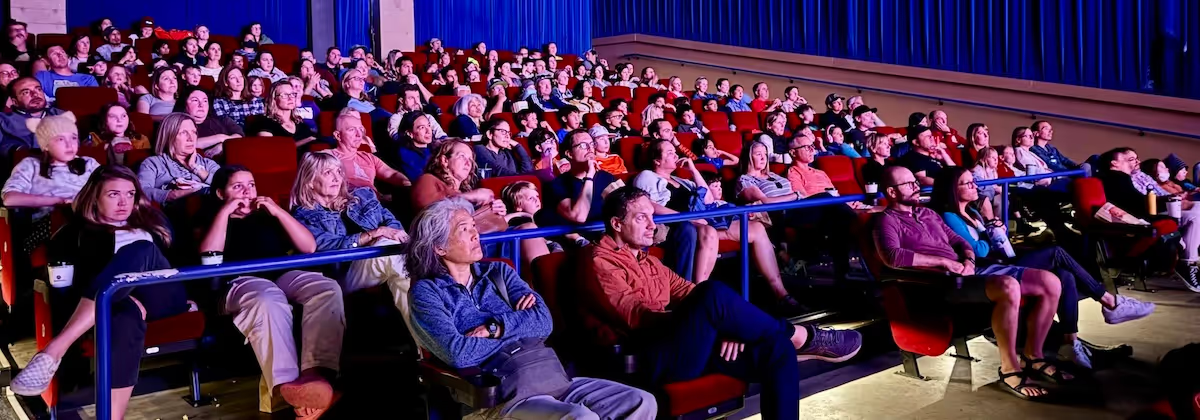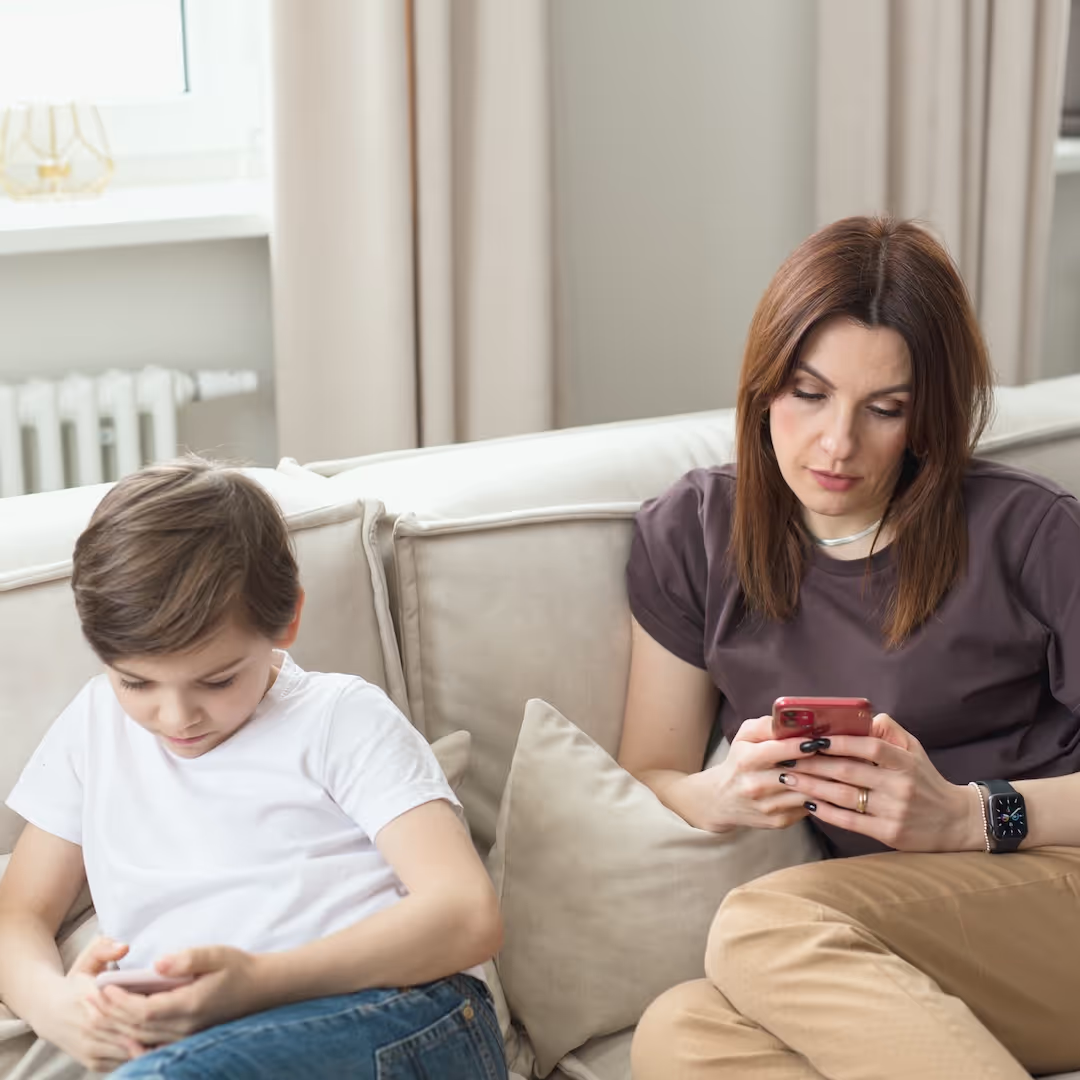


Thank you to everyone who has been attending the rollout premieres nationwide of our new film, Screenagers Elementary School Age Edition. Partnering with Wait Until 8th for many of these events has been such fun! Every day we list new screenings on this page!
I want to thank you, Seattle, for making our sold-out screening on Sunday night such fun! I was delighted that over 15 kids raised their hands to share their insights or ask questions during my Q&A.

Many young people use social media A LOT. The nonstop stream of algorithm-curated media, combined with constant connections to friends and others, creates an intense and overwhelming experience.
In a recent heart-wrenching New Yorker article, the brilliant Andrew Solomon says about Instagram, “A complaint filed by Bucks County, in Pennsylvania, asserts that the defendants’ platforms hijack a tween and teen compulsion — to connect — that can be even more powerful than hunger or greed.” I am not sure exactly how Bucks County can make that comparison, but in my opinion, it rings true.
Social media users can become so consumed with it that they seriously can push out important things in their lives, such as sleep, school work, friendships, creative time, and so forth.
This topic is so important that this week’s podcast, entitled, Tackling Problematic Social Media Use, focuses on ways to treat the condition. I hope you will check it out. Listen Here: Apple Podcasts // Spotify // YouTube // Website
My goal is that young people, say ten years old and up, have a chance to grapple with the idea of problematic social media use. Not only will they gain insight into problematic use, but they will also be able to spot it and possibly help when they see it in people they care about.
And by all means, don't lose this opportunity to talk with youth about the fact that over 200 hundred school districts and municipalities are suing Meta and other social media platforms for various harms, including harm caused by social media addiction.
This is similar to how people started suing pharmaceutical drug companies, like Purdue, for claiming their opioid products were not addictive when in fact, they were. The more we can help young people recognize the deeper issue — a broken system where industries reap massive profits while policymakers lag dangerously behind — the better equipped they'll be to navigate it.
And since I am sitting at my desk in Seattle at this moment, let me add that Andrew Solomon also wrote that part of the reason the Seattle school district filed the lawsuit was "the expense of training teachers to recognize signs of social media addiction.”
Today, I address two questions: First, what is problematic social media use from a clinical perspective? And second, what are ways our kids can talk with a friend (or family member) if they are worried their friend might have some level of problematic use?
Learn more about showing our movies in your school or community!
Join Screenagers filmmaker Delaney Ruston MD for our latest Podcast

Learn more about our Screen-Free Sleep campaign at the website!
Our movie made for parents and educators of younger kids
Learn more about showing our movies in your school or community!
In medicine, we use the term “problematic use” for things like substances, such as cannabis use disorder and alcohol use disorder.
Believe it or not, the word “addiction” is not in our main book of diagnoses called the DSM 5. As doctors, we still use the word addiction, but many of us, myself included, are making a big effort to really say use disorder.
I prefer the term “use disorder” because it acknowledges that addiction exists on a spectrum. The key issue is the extent to which a behavior or substance use becomes problematic in someone’s life, even if they continue to engage in it and may or may not have tried to stop.
When it comes to social media, mainly those in the field of research and treating it are now referring to it as problematic social media use. Talking with colleagues about this, it is thought that eventually, the DSM 5 will have a term called Internet Use Disorder, and under that will be specific categories, such as social media use disorder. Thus eventually, it may be discussed as a use disorder.
A definition of Problematic Social Media Use (PSMU) is the following:
“the lack of regulation of one’s use of social media is associated with negative outcomes in everyday functioning.”
Of course, life is never so simple, and when researchers try to study the phenomenon, they use different measurement tools, which is one of the many reasons it is hard to have a clear understanding of its prevalence. Also, since problematic use is along a scale, it is not an either-or.
For discussion's sake, it can be useful to talk about PSMU compared to the idea of overuse.
Social Media Overuse: This refers to spending more time on social media than is necessary or recommended, leading to potential disruptions in daily life.
I think a good way to discuss this is to offer these ideas to your child or student and see what they think they could actually say to someone vs. what they would not want to or would not think would be effective. Here are some ideas:
Learn more about showing our movies in your school or community!
Join Screenagers filmmaker Delaney Ruston MD for our latest Podcast

Learn more about our Screen-Free Sleep campaign at the website!
Our movie made for parents and educators of younger kids
Join Screenagers filmmaker Delaney Ruston MD for our latest Podcast
Be sure to subscribe to our YouTube Channel! With new ones added regularly, you'll find over 100 videos covering parenting advice, guidance, podcasts, movie clips and more. Here's our latest!
As we’re about to celebrate 10 years of Screenagers, we want to hear what’s been most helpful and what you’d like to see next.
Please click here to share your thoughts with us in our community survey. It only takes 5–10 minutes, and everyone who completes it will be entered to win one of five $50 Amazon vouchers.
Thank you to everyone who has been attending the rollout premieres nationwide of our new film, Screenagers Elementary School Age Edition. Partnering with Wait Until 8th for many of these events has been such fun! Every day we list new screenings on this page!
I want to thank you, Seattle, for making our sold-out screening on Sunday night such fun! I was delighted that over 15 kids raised their hands to share their insights or ask questions during my Q&A.

Many young people use social media A LOT. The nonstop stream of algorithm-curated media, combined with constant connections to friends and others, creates an intense and overwhelming experience.
In a recent heart-wrenching New Yorker article, the brilliant Andrew Solomon says about Instagram, “A complaint filed by Bucks County, in Pennsylvania, asserts that the defendants’ platforms hijack a tween and teen compulsion — to connect — that can be even more powerful than hunger or greed.” I am not sure exactly how Bucks County can make that comparison, but in my opinion, it rings true.
Social media users can become so consumed with it that they seriously can push out important things in their lives, such as sleep, school work, friendships, creative time, and so forth.
This topic is so important that this week’s podcast, entitled, Tackling Problematic Social Media Use, focuses on ways to treat the condition. I hope you will check it out. Listen Here: Apple Podcasts // Spotify // YouTube // Website
My goal is that young people, say ten years old and up, have a chance to grapple with the idea of problematic social media use. Not only will they gain insight into problematic use, but they will also be able to spot it and possibly help when they see it in people they care about.
And by all means, don't lose this opportunity to talk with youth about the fact that over 200 hundred school districts and municipalities are suing Meta and other social media platforms for various harms, including harm caused by social media addiction.
This is similar to how people started suing pharmaceutical drug companies, like Purdue, for claiming their opioid products were not addictive when in fact, they were. The more we can help young people recognize the deeper issue — a broken system where industries reap massive profits while policymakers lag dangerously behind — the better equipped they'll be to navigate it.
And since I am sitting at my desk in Seattle at this moment, let me add that Andrew Solomon also wrote that part of the reason the Seattle school district filed the lawsuit was "the expense of training teachers to recognize signs of social media addiction.”
Today, I address two questions: First, what is problematic social media use from a clinical perspective? And second, what are ways our kids can talk with a friend (or family member) if they are worried their friend might have some level of problematic use?
In medicine, we use the term “problematic use” for things like substances, such as cannabis use disorder and alcohol use disorder.
Believe it or not, the word “addiction” is not in our main book of diagnoses called the DSM 5. As doctors, we still use the word addiction, but many of us, myself included, are making a big effort to really say use disorder.
I prefer the term “use disorder” because it acknowledges that addiction exists on a spectrum. The key issue is the extent to which a behavior or substance use becomes problematic in someone’s life, even if they continue to engage in it and may or may not have tried to stop.
When it comes to social media, mainly those in the field of research and treating it are now referring to it as problematic social media use. Talking with colleagues about this, it is thought that eventually, the DSM 5 will have a term called Internet Use Disorder, and under that will be specific categories, such as social media use disorder. Thus eventually, it may be discussed as a use disorder.
A definition of Problematic Social Media Use (PSMU) is the following:
“the lack of regulation of one’s use of social media is associated with negative outcomes in everyday functioning.”
Of course, life is never so simple, and when researchers try to study the phenomenon, they use different measurement tools, which is one of the many reasons it is hard to have a clear understanding of its prevalence. Also, since problematic use is along a scale, it is not an either-or.
For discussion's sake, it can be useful to talk about PSMU compared to the idea of overuse.
Social Media Overuse: This refers to spending more time on social media than is necessary or recommended, leading to potential disruptions in daily life.
I think a good way to discuss this is to offer these ideas to your child or student and see what they think they could actually say to someone vs. what they would not want to or would not think would be effective. Here are some ideas:
Be sure to subscribe to our YouTube Channel! With new ones added regularly, you'll find over 100 videos covering parenting advice, guidance, podcasts, movie clips and more. Here's our latest!
Sign up here to receive the weekly Tech Talk Tuesdays newsletter from Screenagers filmmaker Delaney Ruston MD.
We respect your privacy.
Thank you to everyone who has been attending the rollout premieres nationwide of our new film, Screenagers Elementary School Age Edition. Partnering with Wait Until 8th for many of these events has been such fun! Every day we list new screenings on this page!
I want to thank you, Seattle, for making our sold-out screening on Sunday night such fun! I was delighted that over 15 kids raised their hands to share their insights or ask questions during my Q&A.

Many young people use social media A LOT. The nonstop stream of algorithm-curated media, combined with constant connections to friends and others, creates an intense and overwhelming experience.
In a recent heart-wrenching New Yorker article, the brilliant Andrew Solomon says about Instagram, “A complaint filed by Bucks County, in Pennsylvania, asserts that the defendants’ platforms hijack a tween and teen compulsion — to connect — that can be even more powerful than hunger or greed.” I am not sure exactly how Bucks County can make that comparison, but in my opinion, it rings true.
Social media users can become so consumed with it that they seriously can push out important things in their lives, such as sleep, school work, friendships, creative time, and so forth.
This topic is so important that this week’s podcast, entitled, Tackling Problematic Social Media Use, focuses on ways to treat the condition. I hope you will check it out. Listen Here: Apple Podcasts // Spotify // YouTube // Website
My goal is that young people, say ten years old and up, have a chance to grapple with the idea of problematic social media use. Not only will they gain insight into problematic use, but they will also be able to spot it and possibly help when they see it in people they care about.
And by all means, don't lose this opportunity to talk with youth about the fact that over 200 hundred school districts and municipalities are suing Meta and other social media platforms for various harms, including harm caused by social media addiction.
This is similar to how people started suing pharmaceutical drug companies, like Purdue, for claiming their opioid products were not addictive when in fact, they were. The more we can help young people recognize the deeper issue — a broken system where industries reap massive profits while policymakers lag dangerously behind — the better equipped they'll be to navigate it.
And since I am sitting at my desk in Seattle at this moment, let me add that Andrew Solomon also wrote that part of the reason the Seattle school district filed the lawsuit was "the expense of training teachers to recognize signs of social media addiction.”
Today, I address two questions: First, what is problematic social media use from a clinical perspective? And second, what are ways our kids can talk with a friend (or family member) if they are worried their friend might have some level of problematic use?

It feels like we’re finally hitting a tipping point. The harms from social media in young people’s lives have been building for far too long, and bold solutions can’t wait any longer. That’s why what just happened in Australia is extremely exciting. Their new nationwide move marks one of the biggest attempts yet to protect kids online. And as we released a new podcast episode yesterday featuring a mother who lost her 14-year-old son after a tragic connection made through social media, I couldn’t help but think: this is exactly the kind of real-world action families have been desperate for. In today’s blog, I share five key things to understand about what Australia is doing because it’s big, it’s controversial, and it might just spark global change.
READ MORE >
I hear from so many parents who feel conflicted about their own phone habits when it comes to modeling healthy use for their kids. They’ll say, “I tell my kids to get off their screens, but then I’m on mine all the time.” Today I introduce two moms who are taking on my One Small Change Challenge and share how you can try it too.
READ MORE >
This week’s blog explores how influencers and social media promoting so-called “Healthy” ideals — from food rules to fitness fads — can quietly lead young people toward disordered eating. Featuring insights from Dr. Jennifer Gaudiani, a leading expert on eating disorders, we unpack how to spot harmful messages and start honest conversations with kids about wellness, body image, and what “healthy” really means.
READ MORE >for more like this, DR. DELANEY RUSTON'S NEW BOOK, PARENTING IN THE SCREEN AGE, IS THE DEFINITIVE GUIDE FOR TODAY’S PARENTS. WITH INSIGHTS ON SCREEN TIME FROM RESEARCHERS, INPUT FROM KIDS & TEENS, THIS BOOK IS PACKED WITH SOLUTIONS FOR HOW TO START AND SUSTAIN PRODUCTIVE FAMILY TALKS ABOUT TECHNOLOGY AND IT’S IMPACT ON OUR MENTAL WELLBEING.
